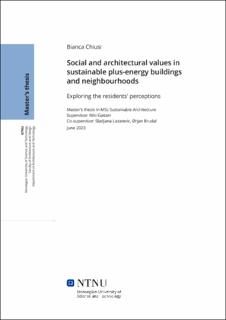| dc.description.abstract | The importance of creating well-designed buildings and neighbourhoods is widely recognised, as is the necessity to focus on environmental, economic, and social sustainability in order to achieve good architecture. While there is an agreement on the benefits brought by good design that achieves these goals, it is harder to find a clear definition of what the value of design actually is. The somewhat subjective nature of design value and its multi-faceted character present a clear obstacle in reaching a common definition, and this leads to a simplified understanding of design value that prioritises the more objective and measurable aspects.
Still, the creation of holistically good architecture entails a full comprehension of the value of design and its meaning for all the stakeholders involved. The aim of this thesis is to investigate different interpretations of design value and to reach a common and comprehensive definition. Multiple EU-funded projects are also considered, to verify how their assessment frameworks reflect their understanding of design value. The focus is then shifted to the end-users of the built environment, and their perception of the value of design is questioned. The introduction of a case study selected from one of the previously introduced European projects allows to test the understanding of design value in a practical setting, and to conduct an in-depth qualitative exploration of an otherwise intricate and complex topic. The chosen case study, t’ Houdhtof / Maatschappelijk Mooi, is of declared environmental, economic, social and architectural quality: the focus is thus shifted on the user’s perspectives, to question how they truly perceive the value of the space. This investigation is carried out through a survey, that specifically targets the user’s point of view on social and architectural values: these aspects of design value have a fundamental subjective facet, and surveying people’s perception is essential to achieve a comprehensively good architecture. | |
